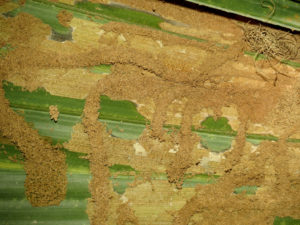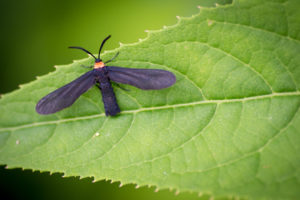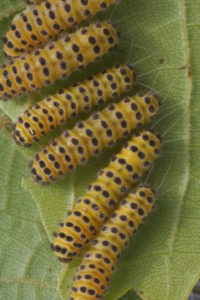How to control leaf skeletonizer
I have been deciding for some time now to write on this topic and kept putting it off but what caused me or inspire me this week to give it a go was taking notice of a Giger tree in one of the gardens which are located at our international airport that has been skeletonized.
My goal in writing this post is also to help those that are experiencing these issues to be able to eliminate this problem with the information that is provided. It gives such a wonderful feeling to walk in our gardens and to take notice of how well each plant is performing and growing.

However, our gardens and landscapes are always under attack by insect pests. There are many methods that are used in bringing these garden insect pests under control such as
1. Mechinal Control-Which involves the use of pruning and handpicking
2. Chemical Control-Which involves the use of chemicals such as insecticidal soap sprays, organics, and other pesticides that can be harmful to humans and pets which should be used with caution by reading the manufactures label and following the direction.
3. Biological Control-Which involves the use of good bugs such as ladybugs, praying mantis, mealybug destroyer, etc… to get rid of garden insect pests.
Each of these methods has its advantages over garden insect pests based on timing. A garden issue that affects many garden plants is the leaf skeletonizer that causes severe damage to plants.
Many home gardeners are confused when facing this problem without a clue as to what it is or what to do. In this article, we will be taking a closer look at the leaf skeletonizer and how to bring this pest problem under control.

What is leaf skeletonizer?
Leaf skeletonizer is when the leaves of your garden plants are so damaged that there is nothing left except the rib structure or skeleton if I can use that word. The garden pests that are responsible for this destruction are this moth that’s in this photo.
How does leaf skeletonizer works?
The adult moth lays her eggs on the underside of the plant leaves in a cluster, the reason for the adult moth laying her eggs on the underside of the leaves is to protect her eggs from predator insects and the elements such as the sun, rain, and wind.

Once the eggs have hatched the larvae start feeding on the leaves. These larvae are heavy feeders or have a huge appetite, this is the reason for such destruction. The lifecycle of these larvae includes five stages. With each stage, the larvae grow larger.
As we all know plants manufacture their food by means of a process called photosynthesis, which is made possible by the plant leaves that contain chlorophyll, because of the leaves being skeletonized the plant is unable to produce its foods when this happens your garden plant goes under further stress which puts the entire plant in danger of dying.
That’s why it is so important to deal with this issue immediately seeking to eliminate the insect pest that is responsible for this.
Leaf skeletonizer in your garden
How to control these insects
Controlling these insects and bringing them under control is the first step in the right direction to help your garden plants recover.
Cultural Practices
Proper cultural practice is a great way to lessen the chance of your garden plants falling prey to this issue and if your garden plants should fall prey these practices along with proper treatment will help your plant to bounce back. Meeting the full requirements of your garden plant needs is so important. These requirements include.
1. Proper location of your garden plant as far as light requirements are concerned.
2. The right soil type.
3. Give your garden plants the right amount of water.
4. Placing your plants on a fertilizer program and follow feeding directions that are found on the manufacturer’s label.
Mechinal Control
Mechanical control is a good method to implement in the war against these insects. Handpicking-with a flashlight at nighttime. Take a walk in your garden, you are sure to find some of these insect pests also pruning and eliminating infected leaves properly will also help in bringing these insect pests under control.
Chemical Control
A word of caution here, when using chemicals apply the least toxic first seeking to get results, and always follow the manufacturer’s direction that is on the label because as I was thought by my instructor is the law. Here are some chemicals which have proven to be effective.
1. Bacillus thuringiense.
2. Insectdial soap spray.
3. Horticultural grade oil.
4. Neem oil.
5. Bayer advanced vegetable and garden insect spray rts.
6. Bayer advanced vegetable and garden insect spray.
The final word
Don’t despair all is not lost though your garden plants may be sickly and fighting for their lives with your help and by implementing these steps your garden plants will bounce back to good health performing at their best being something you can be proud of.
About the author
Norman loves being in the garden, both at home and for his job....
he is 'Natures Little helper' being outdoors, growing his vegetables and flowers from an early age.
Now having spent over 22 years in the profession he want to give some of his knowledge to others...
his vast array of hints and tips you will find scattered over this site will help you no end growing plants in your garden.

Awesome article Norman. These pests are really dangerous and I had an experience with them. What I don’t like is that I need to use chemicals on my plants but it is a must. I will recommend this post to friend of mine who is gardener and he also have a problem with these nasty pests.
Hello Daniel so good to hear from you. These pest are certainly a real problem and must be treated right away. So happy that I could help and thanks so much for spreading the word for me. If ever I can help please let me know. All the best of success and have a good day.
This is a really interesting article at my house we have this bush that is really tall and flowers these beautiful all white pedals on the inside of the flower it is like marine or purpleish color. We have a few of those around the house I forget the name of it though. Well this spring and summer was the first time the leaves were all gone. They were ate up so bad that only the stems were left.
I knew it was a bug but when I really noticed what happens they were all gone and now the bush went bare way early. I really feel bad for the bush since it has such a beauty to it I know some would say “it is just a plant why does it matter?” Me personally I see plants nature’s way of showing it’s beauty.
They may be plants but they do help out in the environment in its own ecosystem with all the bees and butterflies getting it sweet nectar that also help pollinate other plants. Now I know what this is called and now I know what things I can do to prevent this to heppem again.
Thanks for the share I really do appreciate the knowledge I have learned something new today.
Matt
Hello Matt so good to hear from you and it is so sad to hear what happen to your beautiful plant. Plants are really amazing and serve us in so many ways and you made some good points about the benefits of plants. I am so happy that I could help. All the best to you and have a good day.
It is really sad to me to see this I understand that all animals need their food and they should survive it just sucks that some insects can be so destructive you know?
I do love nature and I love all types of flowers with all their different unique smells colors and shapes. I really do appreciate all the information and I will have to bookmark this site so I can come back for more good information. I know I will learn something new I hope the best for you and thanks again’
Matt
I wish I had read this post years ago. After reading this article I think that the Leaf Skeletonizer was responsible for the death of two of my favorite trees, they had the same characteristics that I read here, and I did not think I could do anything about it. It is really very sad but now I have the accurate information in case it happens again.
Hello Paloa so happy to see you and I am so sorry to hear about your plants. But it is good to know that you have the right information for future reference. So Happy that I could help. All the best to you and have a wonderful day.
What a great article. In the past I have had issues with this exact same thing but never really new how to figure out what it was. I dont have a garden anymore but it is still great to have the knowledge. Maybe one day I can help someone else. This is a must read for anyone dealing with gardens. Insects can be devastating if not controlled. Thank you for the great information.
Hello Dale so nice to see you. Leaf skeletonizer is a big deal and having the right information when dealing with this problem can make a big difference. So happy that I could help. All the best to you and have a good day.
Hello Norman.
I have two questions and I hope you could help me with them.
1. Do you know of any organic products that I could use on plants to avoid those pests?
2. Do you know of any organic products that I could use to eliminate termites?
Thanks for sharing this great information.
Hello Veronica so happy to see you. Oraganic pesticides are a great way to take care of garden insects pest because this is a safe way. I wrote this post a few weeks ago on insecticidal soap that may be of some help just click on the link
https://gardenofedengardencent… you can also have a look at this article on homemade remedies that is also safe to use around children and pets https://gardenofedengardencent…
When it comes to termites you can use these natural methods. Boric acid which dehydrates the insects and stops their nervous system. The use of salt and water. The water has to be very salty for this to be effcetive. Fill a syringe with this solution and inject it into the areas that has to be treated.
Termites hates the sun if possible exposing the area to sunlight will bering them under control. These are just a few natural ways to get rid of termites. Please let me know how it goes. All the best of success and have a good day.
Hi and thanks for this review. I found it extremely helpful and refreshingly easy to follow. You seem to have a good grasp of gardening and have some really useful tips. I will be looking at your site again for sure. What would you do if the remedies you describe don’t work on their own, can you do more than one of the preventative measures at the same time, or will it damage to plants? Thanks, Kenny
Hello Kenny so happy that I could help. In my opinion because your garden plant is already under stress I would just stick with on method and give it chance. Some may not agree but the gold is to elimanate these pest and not your plant. Just give it time along with the proper cultrual practice and you will be just fine. Hope this help. All the best to you and have a good day.
Very informative article and you made it so simple to understand , Now i will really know how to take care of my garden , think i know now the reason for the death of my trees i will share your article with my friends also because they had the same problem now we all can fix it . Great Job
Aly so good to see you. Garden insect pest can do so much damage but the good news is with the right information we can win the war on these insect pest so that our garden plants can grow healthy. So happy that I could help and thanks so much for sharing this information with your friends. All the best to you and have good day.
I never knew there was a term for this! It was really cool to learn about what causes this to happen and it also brought back so many memories from my childhood because I used to see leaf “skeletons” and stare at them for hours. Sometimes I would take them and try to tie them together without causing them to fall apart (that’s really hard to do, but possible!) and I’d hang them over the doorway in the barn, even though my dad hated it.
Hello so happy to meet you and glad I could help. This issue is caused by garden insects pest. But with the right information being applied we can win the war on these insects pests. Have a good day.
Anyone that has had a garden know that insects that attack plants can really be a big problem. Trying to fend off these plant killers can be tough. One thing I do know is that when dealing with these sought of issues it is always best to make use of the right remedy.
One has to be careful when making use of chemicals on these insects because using some chemicals can kill the nutrients of the plant. I would have to say that when it comes to these sought of insect, I prefer making use of the mechanical control to get rid of them.
Hello Jay it is so good to know that you would rather use the safe approach which is so good for our health and the environment. Thanks so much for sharing and have a good day.
I had experienced this leaf turned into skeleton-like but I did not know that the adult pest is that moth. I did the mechinal method. I pruned the infected leaves and left those that were not. It is difficult to control the adult moth from laying eggs without using chemical, but once it layed her eggs, you can easily find them on the leaves, so you can remove them before they turn into larvae. By doing this continually you could wipe out the pests in no time without using chemicals.
Dan that is so wonderful to hear. It is always good to use the safe approach so we can keep our environment toxic free. Thanks so much for sharing. Have a good day.
This is helpful information I will share with my mother who is the gardener in the family. She’s always growing different plants in her front yard and lots of vegetables in her garden. Which methods are best to use so it won’t affect the food she is growing? I know she would prefer somethin safe or natural. I can see ladybugs in her garden when I visit her and there is natural light. What other solution would you recommend for a vegetable garden?
Hello John, I see that your mother has a green thumb which is so wonderful. A safe approach to treating edible foods is with the help of insecticidal soaps which you can read the label upon purchasing also organic sprays or you can make you own homemade insects sprays. Here is a few links that may offer some help.
https://gardenofedengardencent… https://gardenofedengardencent…
https://gardenofedengardencent… Hope this help, all the best to you and have a good day.
It never occurred to me that one can actually use the good bugs to eliminate the bad ones. Obviously this might not be always possible, but I’d love to use this approach for my own garden needs in the future whenever possible. Yet the approach involving other bugs, probably is the most expensive one. Am I right?
Are there any specific bugs that would deal with moths effectively? And if yes, what are they and are there any negative consequences or just aspects that need to be considered, if they’re used as the approach for eliminating moths.
Either way, thank you for all the insights, I really enjoyed the article. I sincerely appreciate it.
Cheers and have a Great One!
Matiss
Hello Matiss so happy to hear from you and I hear your concern. When using insects as a means of biological control the process of bringing garden insect pest under control may take a lot longer. If the insect pests population is low then it is good to use this method. As far as expense is concerned there are many chemicals because of their quick knock down that will cause you more money.
Getting rid of garden moths may be possible with the use of parasitic wasp that are natural predators which will not harm your garden plants. Also insecticidal soap is another safe approach when treating edible plants. These post may offer some help.
https://gardenofedengardencent… https://gardenofedengardencent…
I am so happy that I could help. All the best to you and have a good day.